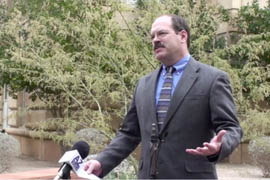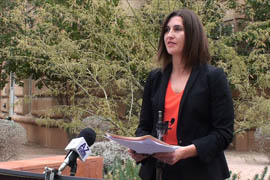Cronkite News has moved to a new home at cronkitenews.azpbs.org. Use this site to search archives from 2011 to May 2015. You can search the new site for current stories.
Group gives Phoenix grade of D on spending transparency
PHOENIX – A public watchdog group on Wednesday gave Phoenix a grade of D for its online disclosure of spending information, ranking it 19th among the 30 largest cities in the U.S.
The report, by the Arizona Public Interest Research Group Education Fund, ranked and graded cities from A to F based on how much information each city provides online and how searchable that information is.
Phoenix’s lack of a centralized transparency website was largely to blame for its low grade, which puts it behind cities such as Chicago, New York, Denver and Los Angeles.
Serena Unrein, public interest advocate for Arizona PIRG, said for Phoenix to receive a higher grade, it would need a transparency website that would provide details on city spending, including tax expenditures, down to individual transactions.
“I think that if Phoenix wants to be a leading city, it’s really important for the city to actually provide that information to its residents,” she said.
Unrein presented the findings at a news conference alongside Byron Schlomach, director of the Center for Economic Prosperity at the Goldwater Institute, an independent watchdog group that promotes limited government and free enterprise.
“The more citizens know, the more they can be informed, and the more than can offer constructive criticism and suggestions to government,” Schlomach said.
A law passed in 2010 required municipal governments in Arizona to launch spending transparency websites by Jan. 1 of this year. Many, including Phoenix, have failed to do so, Unrein said.
Phoenix currently displays a link to its budget on its homepage and posts its annual financial report online, and it held community budget hearings last year that it posted online. These transparency efforts helped save Phoenix from a failing grade, Unrein said, but she added there is much work to done.
Phoenix Mayor Greg Stanton said based on recommendations in the PIRG report the city will take measures to implement a more transparent system.
“My reaction is let’s roll up our sleeves and get to work on additional transparency measures,” he said.
Stanton said that in addition to information on the budget and financial reports, the city’s website also provides a public records search, and all City Council meetings are televised and streamed live.
Phoenix has been in the process of redesigning its budget pages, and Stanton said the update should include a separate transparency website.
A city spokesman shared a statement saying Phoenix is working on a project that will put all expenditures online “in as comprehensive a fashion as possible.”
David Cuillier, an associate professor and director of the University of Arizona School of Journalism, said Phoenix has no excuse for not providing a spending transparency website.
“There are some small towns that have some heartburn about it because, for them, it is a financial issue. They don’t have the staff and money to put toward it,” he said. “But big cities? That’s chump change. I have students in my classes that could probably do it in their sleep.”
Cuillier, who researches public access to government information and served as chairman of the Society of Professional Journalists Freedom of Information Committee, said transparency should be high on the city’s list of priorities.
“If a city is open and transparent, particularly savvy with the Internet, I think that tends to foster trust in that city and credibility and political engagement,” he said.
Unrein said PIRG hopes its findings will spur change in the city.
“I really hope that, when we release this report next year, we can say that the city of Phoenix is one of the best in the country when it comes to spending transparency,” she said.









